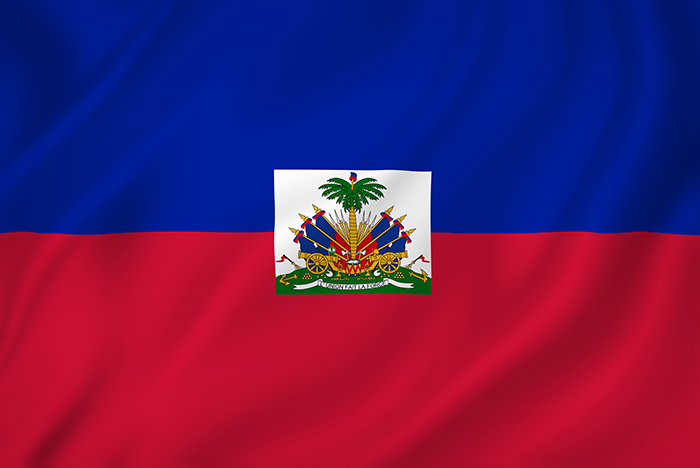Interviews / Latin American/Caribbean
14 October 2024
Haiti, One Year Later… Another Year?

After a series of natural disasters with dramatic consequences in the 2010s, the 2020s opened in Haiti with massive protests against poverty and corruption. The political crisis culminated in the assassination of the country’s president, Jovenel Moïse, and the takeover of a significant portion of the country and the capital by gangs. In response to the disintegration of the Haitian state, the UN reacted by creating an intervention mission led by Kenya one year ago. What is its assessment? What are the implications of this situation for neighboring countries? How are major powers positioning themselves in the face of this crisis? What future can we envisage for the island? Answers from Laurent Giacobbi, Associate Researcher at IRIS and Lecturer at the University of the Antilles.
What is the situation today in Haiti, one year after the UN vote creating the Multinational Security Support Mission (MSSM)?
Voted on October 7, 2023, UN Security Council resolution 2699 established the Multinational Security Support Mission (MSSM) with the goal of creating security conditions conducive to free elections in a country that has not had one since 2016. On September 30, resolution 2751 extended its mandate for another year. Indeed, the situation in Haiti remains extremely chaotic, although, undeniably, some progress has been made in the past year, particularly in the political sphere. In February 2024, Prime Minister Ariel Henry, in power since the assassination of President Jovenel Moïse in July 2021, resigned under pressure from both the gangs and the streets.
In April, the Transitional Presidential Council (CPT) appointed Garry Conille as head of a transitional government. This new prime minister is far from being a stranger: he briefly held this position in 2011 and subsequently had a long and distinguished career at the UN, particularly with UNICEF. While he is known for his seriousness and incorruptibility, he returns to a country he left more than ten years ago, whose realities are now largely foreign to him. However, he has shown much determination since taking office, and his commitment and international credibility could contribute to the recovery of the state in Haiti.
In practice, he found himself inheriting an apocalyptic situation. The riots of February 2024 marked, in some ways, the peak of the security chaos of recent years. The international airport was closed for three months due to attacks by gangs, whose gunfire damaged several civilian aircraft. Armed groups also blocked the capital’s port and carried out acts of piracy to loot merchant ships, leaving Haiti cut off from the world and worsening an already catastrophic humanitarian situation. Police stations were assaulted, leading to dozens of police officers’ deaths, and the two main prisons in the country were stormed, allowing over 1,500 prisoners to escape, many of whom joined the ranks of the gangs.
The declaration of a state of emergency and the imposition of a curfew did not immediately restore calm, leading several countries, including France, to evacuate their nationals. Between 300,000 and 500,000 Haitians had no choice but to leave the capital, which had been left to anarchy, and more than 3,600 people were murdered in the country during the first half of 2024, according to the latest report from the UN High Commissioner for Human Rights.
Meanwhile, this catastrophic situation has caused tensions with neighboring Caribbean countries, particularly the Dominican Republic. Re-elected in May 2024, President Luis Abinader has taken a hard stance toward Haiti, reflected in his first term through massive deportations of illegal Haitian immigrants, the ongoing construction of a militarized wall between the two countries, and an intense military build-up. But the Dominican Republic is not the only country concerned about a potential deterioration of regional security. The participation of Jamaica and the Bahamas in the MSSM, countries with shared maritime borders with Haiti, is far from incidental: these nations, also plagued by violence (Jamaica is among the top 3 countries with the highest homicide rates in the world), aim to prevent the deterioration of living conditions in Haiti from pushing its population to flee to neighboring countries, and to address the issue at its source to prevent the spread of gang violence into their own territories. In this context, it is revealing that, in parallel with their involvement in the MSSM, both countries have been strengthening their border surveillance capabilities for several years, through the purchase of radar, drones, and maritime patrol boats. This is also true politically via CARICOM, of which Haiti is a member: the Caribbean Community’s involvement in negotiations seeking a political solution to stabilizing Haiti’s government can certainly be seen as an expression of Caribbean solidarity, but it can also be analyzed as a means to prevent or contain the spread of Haiti’s chaos in the region.
As we can see, the UN resolution passed a year ago has not fundamentally improved the situation inside or outside the country nor the daily lives of the 11 million Haitians, despite the delayed deployment of the MSSM.
This multinational mission was particularly slow to be implemented. What difficulties did it face?
The decision to place Kenya at the head of this mission raised many questions early on. The lack of knowledge of the terrain and the two official languages of the country (Creole and French), as well as the reputation for violence of the Kenyan police, immediately called into question the appropriateness of such a choice. This was all the more concerning given that the decision of Kenyan President William Ruto to volunteer for the mission’s leadership was far from unanimous within his own country. The Kenyan opposition voiced these doubts through legal actions, particularly before the Supreme Court, which delayed the actual deployment of troops to Haiti by several months. The issue of funding for the mission, estimated at $600 million, also contributed to the delay in its deployment, as the Kenyan head of state was unwilling to send troops until he was sure the necessary funds, which were slow to arrive, were available. This political-legal impasse raises questions about the preparation of this decision and the credibility of the Kenyan choice.
However, this period of uncertainty was used to secure the airport’s surroundings and strengthen the material capabilities of the Haitian National Police (PNH) through numerous donations (armored vehicles, personal equipment) from Canada, the United States, France, and Taiwan. These long months also allowed for the development of training for both the PNH and the police forces called to intervene, such as those from the Bahamas and Jamaica.
After several months of hesitation and confusion, it was only in early June 2024, nine months after the UN Security Council vote, that the first 200 Kenyan police officers finally arrived in Haiti. By the end of July, Kenya sent an additional 200 police officers, along with the first 24 Jamaican soldiers. One year after the UN vote, the MSSM, which was initially supposed to deploy 2,500 members, now has fewer than 500. The situation is even more concerning given that the first joint field operations between the MSSM and the PNH have not yet led to any major progress, and the Kenyan police have already suffered their first bullet injuries.
What prospects can be envisioned for Haiti today?
The goal of holding elections in February 2026, as announced a year ago, seems extremely difficult to achieve. It is unlikely that, in this time frame, security will be restored and that a nationwide vote can take place.
The power of the gangs has not diminished despite the arrival of the first foreign forces. After initially attempting to negotiate their surrender in exchange for amnesty, a proposition rejected by Prime Minister Garry Conille, they now seem to be adopting a “dilution” strategy: they are redirecting part of their forces and criminal activities away from the capital, particularly to surrounding regions of Port-au-Prince, such as Artibonite. A terrible symbol of this strategic shift occurred on October 4, when members of the criminal group “Gran Grif” massacred at least 70 people with automatic weapons, including 10 women and three infants, in a village in this department.
If this trend of expanding the area of conflict continues, it could relieve the pressure on a capital long scarred by years of bloody clashes and rampant crime. However, under these conditions, the rest of the country, which had been less impacted by gang violence, could fall under their control and suffer from the relative calm in the capital. Finally, gangs that choose a less centralized form of organization and more diffuse methods of action would be much harder to eradicate permanently and could rebuild their strength once the MSSM withdraws from Haiti. The initial delays of this mission have thus resulted in reduced effectiveness in facing gangs that have had time to adapt to the new security situation in the country.
Haiti’s future still largely depends on the capacity of this mission to restore order. The financial difficulties, the small number of troops currently deployed, the slow pace of its deployment, and the persistent uncertainty about its organization and coordination with Haitian law enforcement are all troubling signals. The hesitation of Benin is revealing of the difficulties of this mission: after announcing in February 2024 that it would send more than 2,000 soldiers, the African country has expressed reservations about the predominantly police composition of the mission and is now threatening to backtrack on its commitments.
On the international scale, the United States and Ecuador, who initiated the new resolution, initially discussed the possibility of transforming the MSSM into a peacekeeping mission, but the People’s Republic of China and Russia opposed this. These two countries had already expressed reservations during the vote on the first UN resolution last year, particularly denouncing the inaction of the United States in fighting illicit gun trafficking that fuels the gangs from Florida. Behind the issue of international aid to Haiti, whether security or humanitarian, there are other diplomatic stakes surrounding the Caribbean nation, one of the last thirteen countries in the world to recognize Taiwan. China, by playing its own tune in supporting the international mission while promising to actively finance the country’s reconstruction, alternates between warm and cold gestures and dreams of seeing Haiti switch to its side.
Under these conditions, it is clear that the Republic of Haiti has not yet emerged from the quagmire it has been stuck in for several years, despite the UN Security Council resolutions that have thus far had little effect considering the severity of the situation.

